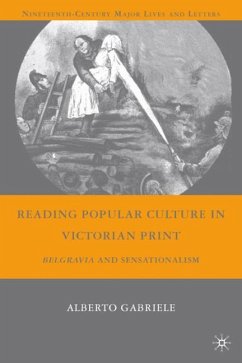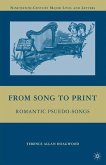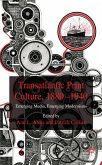Reading Popular Culture in Victorian Print: Belgravia and Sensationalism is a comprehensive study of the whole run of the monthly periodical Belgravia under the direction of Mary Elizabeth Braddon. It traces the material history of the magazine, its production and global distribution while at the same time placing its history and content in the context of Victorian popular culture and Victorian discursive formations. Among the questions Reading Popular Culture in Victorian Print investigates are the status of authors in the marketplace, the innovative place Belgravia holds in the history of print culture, the rhetoric of sensationalism in fiction, journalism and pre-cinema, the representation of trade with India, and the use of urban space as a branding strategy. It makes the claim that the periodical is the sensation novel of the 1860s.
"Reading Popular Culture in Victorian Print is a wide-ranging exploration of the 'trope of sensationalism' in the Victorian periodical press . . . the range of fascinating subjects covered makes it of use and interest to an equally diverse range of researchers. Mary Elizabeth Braddon's Belgravia is focussed also as a case study for considering the ways in which we can approach periodical research."-Victorian Periodicals Review
"Reading Popular Culture in Victorian Print is a wide-ranging exploration of the 'trope of sensationalism' in the Victorian periodical press, ... the range of fascinating subjects covered makes it of use and interest to an equally diverse range of researchers. Mary Elizabeth Braddon's Belgravia is focussed also as a case study for considering the ways in which we can approach periodical research." - Helena Ifill, Newcastle University
'Reading Popular Culture in Victorian Print uncovers clues to Victorian reading practices that anticipate our engagement with digital hypertextuality. By placing Belgravia in the context of an emergent modernity, Gabriele also illuminates a critical episode in Victorian history and shows how periodicals helped shape Victorian culture.' Mary Poovey, New York University and author of Genres of the Credit Economy'Reading Popular Culture in Victorian Print is a well-researched, engaging contribution to our understanding of nineteenth-century popular culture. Gabriele is an impressive young scholar equallyat home in the archive and navigating throughpresent-day debates on modernity and sensation. His detailed look at the important Victorian periodical Belgravia fills a significant gap in magazine scholarship, but this book should interest a non-specialized audience interested in cultural globalization, cross-media synergies and the birth of a mass-produced sensational popular culture.' Will Straw, Professor, Department of Art History and Communications Studies, McGill University "Gabriele's book is not only a helpful monograph about the monthly Belgravia under the direction of Mary Elizabeth Brandon (1866-1876), it is also and maybe above all a relevant reflection upon the cultural and social power of the periodical press. It shows clearly how the tropes of 'sensationalism' contributed to shaping the new visual, urban and industrial culture the very frame of our modernity." - Dominique Kafila, Professor, University of Paris-Sorbonne and author of L'Encre et le sang
"Reading Popular Culture in Victorian Print is a wide-ranging exploration of the 'trope of sensationalism' in the Victorian periodical press, ... the range of fascinating subjects covered makes it of use and interest to an equally diverse range of researchers. Mary Elizabeth Braddon's Belgravia is focussed also as a case study for considering the ways in which we can approach periodical research." - Helena Ifill, Newcastle University
'Reading Popular Culture in Victorian Print uncovers clues to Victorian reading practices that anticipate our engagement with digital hypertextuality. By placing Belgravia in the context of an emergent modernity, Gabriele also illuminates a critical episode in Victorian history and shows how periodicals helped shape Victorian culture.' Mary Poovey, New York University and author of Genres of the Credit Economy'Reading Popular Culture in Victorian Print is a well-researched, engaging contribution to our understanding of nineteenth-century popular culture. Gabriele is an impressive young scholar equallyat home in the archive and navigating throughpresent-day debates on modernity and sensation. His detailed look at the important Victorian periodical Belgravia fills a significant gap in magazine scholarship, but this book should interest a non-specialized audience interested in cultural globalization, cross-media synergies and the birth of a mass-produced sensational popular culture.' Will Straw, Professor, Department of Art History and Communications Studies, McGill University "Gabriele's book is not only a helpful monograph about the monthly Belgravia under the direction of Mary Elizabeth Brandon (1866-1876), it is also and maybe above all a relevant reflection upon the cultural and social power of the periodical press. It shows clearly how the tropes of 'sensationalism' contributed to shaping the new visual, urban and industrial culture the very frame of our modernity." - Dominique Kafila, Professor, University of Paris-Sorbonne and author of L'Encre et le sang








